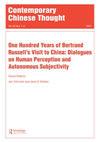The Historical Dynamics of Chinese Thought and the Thesis of Early Enlightenment: An Introduction to the Philosophy of Xiao Jiefu
IF 0.4
3区 哲学
0 ASIAN STUDIES
引用次数: 0
Abstract
After the founding of the People’s Republic of China in 1949, the formation of academic philosophy depended much on the engagement and research of scholars like Xiao Jiefu 萧 萐父 (1924–2008). Xiao Jiefu was gifted with great literary talent and in his youth received a comprehensive education in Chinese traditional literature and thought. During the years of the Chinese–Japanese War, he enrolled in philosophy classes at Wuhan University, relocated to Leshan (乐山) in Sichuan province, and received training in Western philosophy. He graduated with a thesis on Kant’s Metaphysics of Morals in 1947. Later, as a teacher at the university level, he was assigned to reform the study of Chinese philosophy and established the Research Institute of Chinese Philosophy at Wuhan University. His scholarship and academic efforts led to Wuhan University becoming one of the leading institutes on philosophy, and his methodology and research had in general a great impact on the study of Chinese philosophy in China. Western philosophy (especially Marxist philosophy and German Idealism) shaped Xiao Jiefu’s approaches to Chinese philosophy. His interests, however, did not lie in proving the validity of Marxism or developing Marxist thought. Rather, he was interested in using Marxism as a methodological approach to explore the intellectual resources of the Chinese tradition and to stress the importance of philosophical thinking and reflection for the social development of contemporary society. Xiao’s philosophy broke new ground in two aspects: First, his systematic approach to dialectical conceptions contributed substantially to the study of Daoism and Buddhism, as well as to the Yi jing 易经 (Book of Changes). Dialectical relations are inherent in many dyadic figures of Chinese thought. This is so in natural philosophy (Yin and Yang, Qian and Kun, heaven and earth, etc.) as well as in epistemological and ethical conceptions, for instance, knowledge and action or the “self” (ji 己; wo 我) as subject of thinking with its relations to “things” (wu 物) as objects or conditions of action and thought. Since dialectics brings forth conceptual opposites, contrasts, differences, and contradictions, they exercise an intrinsic force on speculative thinking. In this way they push forward intellectual transmission and transformation, while simultaneously reflecting on and interfering with the social and historical contexts present. Second, Xiao Jiefu became well known as a historian of Chinese philosophy and praised for his contributions to the methodology of intellectual history. In the early中国思想的历史动态与早期启蒙命题——萧洁夫哲学导论
1949年中华人民共和国成立后,学院式哲学的形成在很大程度上依赖于肖洁夫萐(1924-2008)等学者的参与和研究。萧洁夫具有很强的文学天赋,年轻时接受过全面的中国传统文学和思想教育。在中日战争期间,他在武汉大学学习哲学课程,并搬迁到四川乐山,接受西方哲学的培训。他于1947年毕业,毕业论文是关于康德的《道德形而上学》。后来,作为一名大学教师,他受命改革中国哲学研究,并在武汉大学成立了中国哲学研究所。他的学识和学术努力使武汉大学成为领先的哲学学院之一,他的方法论和研究对中国哲学研究产生了重大影响。西方哲学(尤其是马克思主义哲学和德国唯心主义)影响了萧洁夫对中国哲学的研究。然而,他的兴趣并不在于证明马克思主义的正确性或发展马克思主义思想。相反,他感兴趣的是用马克思主义作为一种方法论方法来探索中国传统的智力资源,并强调哲学思考和反思对当代社会发展的重要性。萧氏哲学在两个方面有新的突破:第一,他对辩证概念的系统研究对道教和佛教的研究以及对《易经》的研究作出了重大贡献。辩证关系是中国思想中许多二元形象所固有的。自然哲学(阴阳、乾坤、天地等),以及认识论和伦理学的概念,例如知识和行为,“我”(己),都是如此。作为思维的主体,它与作为行动和思维的对象或条件的“物”的关系。由于辩证法带来了概念上的对立、对比、差异和矛盾,它们对思辨思维具有内在的力量。通过这种方式,他们推动了知识的传播和变革,同时反思和干预了当前的社会和历史背景。其次,萧洁夫作为中国哲学史家而闻名,并因其对思想史方法论的贡献而受到称赞。在早期
本文章由计算机程序翻译,如有差异,请以英文原文为准。
求助全文
约1分钟内获得全文
求助全文
来源期刊

CONTEMPORARY CHINESE THOUGHT
Multiple-
CiteScore
0.10
自引率
0.00%
发文量
0
期刊介绍:
This wide ranging journal is essential reading for anyone who wants to understand the diverse themes and influences that shape Chinese thought today. It features translations of the most current and influential Chinese writings on all aspects of philosophical endeavor, from theoretical essays on systems to studies of China"s cultural and religious development, from interpretations of the Chinese classics to exegeses on Marxist thought.
 求助内容:
求助内容: 应助结果提醒方式:
应助结果提醒方式:


